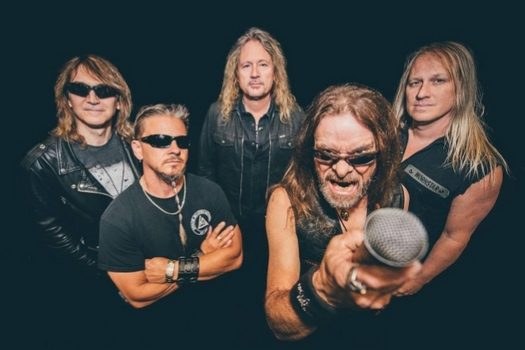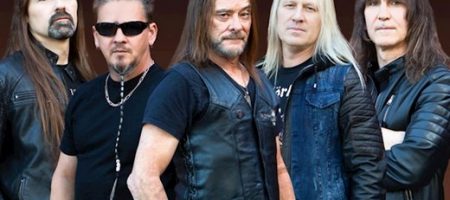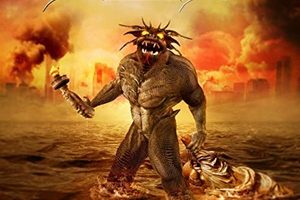Flotsam and Jetsam – Controlled Chaos
Sunday, 6th January 2019
Bountiful times for those deep into the history of metal these days. There’s no shortage of releases, and it seems that many veterans are flying the flag high for creating killer material and capturing a second (or third) generation of metal fanatics. Flotsam and Jetsam burst onto the scene in the 1980’s – probably best known for a certain bassist Jason Newsted joining the Metallica ranks following their debut album Doomsday for the Deceiver, beyond their super exciting blend of progressive power/melodic thrash action of said album and the follow up No Place for Disgrace.
Changing tides and changing labels from MCA down to Metal Blade and now with AFM – the band contains a mix of veteran players that on their latest album The End of Chaos proves that the chops and instinct to write strong, hook-oriented material is still on high. Check out the fierce riffs and relentless speed action during “Control” or the guitar interplay within “Snake Eye” to know Flotsam dials in their multi-dimensional sonic assault quite unlike any other band. We felt the need to learn more about the goings on for Flotsam, so we reached out to their newest drummer Ken Mary who was happy to discuss the organic development of this record, his approach to drumming for the band, and a lot of talk regarding the physical versus digital music mediums and what it means for musicians and fans long-term.
Dead Rhetoric: The End of Chaos is the latest Flotsam and Jetsam album. What was the thought process and game plan behind the development and execution of this set of songs?
Ken Mary: It was kind of organic, actually. A lot of the musical ideas came from Steve Conley and Michael Gilbert. There would be a number of demos that they would do and we would choose the ones that seemed to go the best. (Eric) A.K. would demo a bunch of them and then we would pick the ones that we felt would be working. We would work on them as a group, and basically that’s what we did. There were tons of songs, we did 30-40 songs to go through. We really feel like it’s a strong record.
Dead Rhetoric: How difficult of a process is it to whittle down 30-40 song ideas into a 12-song album?
Mary: I don’t think it is (that difficult). It’s a weird thing. Generally, even non-musicians will know when something is right. Instinctively when you hear something, you know this is working and moving me or not moving me. If you have music that’s not really affecting you, whether it’s excitement, anger, or more of a reflective kind of song- it should be spurring some kind of emotion. Everyone know when it is doing something like that.
Dead Rhetoric: Considering this is your first album with the band, how did you want to approach the drumming in comparison to predecessors like Kelly David-Smith, Craig Nielsen, and Jason Bittner?
Mary: I just wanted to be me. I go back to… a lot of the chops and different things that I used on the record, I’ve been using for many years. I think in Flotsam, the difference is there is a lot of speed and a lot of changes that come up very fast. Those are things you have to adjust to, but as far as the playing I didn’t feel like I was influenced by anyone. I tried to do what fit the music and use my library of chops so to speak. That’s pretty much how I approached it.
Dead Rhetoric: How is it to play with such an incredible bassist like Michael Spencer?
Mary: It’s awesome. He’s super dynamic and also very prolific. I think we played some really cool stuff on this record. I know everybody says that they do a great job on their latest record, but in all seriousness everything went very well – and it’s not an easy band to do that with. And I’ll tell you why – maybe the drummer is more busy, or the bass player. In Flotsam, everybody is busy, all of the time! (laughs). It’s like listening to a band where the pedal is pushed to the floor the entire time. Everybody is always riffing and filling, there is stuff going on non-stop. How do you make that work in a musical composition, and have it pleasing to listen to? That’s one of the magical things about Flotsam, with all this chaos going on, it still works. That’s the coolest thing about the band and about this album in particular. There’s a lot of stuff going on.
Dead Rhetoric: Does this make more of a challenge for Eric to know where to pick his spots to shine vocally?
Mary: I think it does. A.K. is honestly is an incredible vocalist, and his instincts are amazing. I’d like to tell you it was a struggle and a fight and all this kind of stuff, but it was quite easy to do this record. Everybody had their contributions, put their two cents in. Everything flowed very well.
Dead Rhetoric: How did you come up with the narrative elements in the video for “Demolition Man”?
Mary: I thought it was very interesting. Honestly it was a concept that when I read the treatment I was like, ‘I don’t know how this is really going to all work together.’ And then when I saw the video, the director Jeremy Trent, he’s really super talented and he did a great job with it. It worked out great. It was interesting, because when you think about the lyrics to “Demolition Man”, it’s really about destruction, blowing up buildings, and the video is nothing to do with that- which I think is cool. It didn’t just use the face value of the lyrics to make a video with it. It does make it a little more interesting and a little more entertaining.
Dead Rhetoric: In a previous interview we did recently for your other band, you mentioned the last extensive Flotsam North American tour you did with Hammerfall. Do you believe as an older band, it’s important to diversify your touring opportunities and play with different styles to hopefully gain new converts while also playing to many of the long-time faithful?
Mary: I’d say yes and no. It really depends on who the artist is that you are touring with. There are certain bands that if you go to play to their audience, they just aren’t going to connect with you- their audience is completely different from who you are and what you represent. And that could be a problem. I think you want to diversify from the aspect of playing with artists that have a good following and have music that is at least similar enough to yours where you can gain some fans. Otherwise you have no real purpose to be out there.
Dead Rhetoric: Prior to joining the band, had you always followed the career of Flotsam and Jetsam – and if so, did you have any favorite albums or songs in their catalog that you are happy to perform live now with the band?
Mary: Absolutely. I didn’t follow them super extensively, but I did follow them more in their early days. I’ve always been aware of their talent and their songs – some of the favorites we play live are “I Live You Die”, “No Place for Disgrace”, “Hammerhead” – all of that stuff. And if you really listen to those albums, it is amazing. I’m not aware of another band that was doing that level of… and it’s almost, I don’t want to call it prog rock, but to some degree it is. There are a lot of time changes, complex transitions going on – and I don’t know if that’s something that non-musicians really understand about the band. That the music is very complex- and it’s another reason why I enjoy playing this, because it’s always a challenge. What the band was doing in the early 1980’s- I don’t think there was another band that could really touch that. At least that I’m aware of.
Dead Rhetoric: What are some aspects of the metal scene that you believe the average fan or consumer has a tough time understanding that go into specific decisions when it comes to band activities or choices that have to be made over a career?
Mary: One of the things that makes it tough, is people ask us if we are going to tour here, tour there. Of course, every band would love to be on tour a lot and see their fans and thank them, be face to face with them. The bottom line is you also have to be able to do it financially. If you can’t make it work financially, you can’t do a tour. We get asked sometimes to do tours where it’s just not financially feasible. That’s one thing that’s tough for fans to understand. When you are putting a tour together, you have to think about whether or not you are going to lose money on a tour, or make money. As much as I would like to say this isn’t a factor and that we are so rich that we don’t have to think about it, that’s not the case.
Dead Rhetoric: Do you believe it’s even more important today to develop band chemistry as you get older for the overall success of your endeavors?
Mary: I don’t know. When you say band chemistry, I don’t think that this is something that can be developed as much as it’s either there or it’s not there. With Flotsam, they’ve had an amazing frontman their entire career with A.K. so that chemistry has always been strong largely due to that fact. But I think that when you have a band, it either works or it doesn’t.
Dead Rhetoric: How conscious is the band when it comes to merchandising and the types of items/products you offer to your fans?
Mary: I’d say honestly – we want to provide the best possible everything to our fans. The show, the album, merchandise- you want to give them a great choice in what they are able to purchase and you also want to give them high quality products. We keep an eye on it, but I wouldn’t say it’s our main focus. Our main focus is really delivering quality music and being able to perform it with excellence live, and making sure that anyone who is spending money to go to a Flotsam show leaves going, wow those guys just crushed. To make sure that every show that we play, people walk away leaving stunned. This last tour, I think we kind of did that. Many people hadn’t seen us before, and they told us that we killed.
Dead Rhetoric: Is it a challenge to find the best setlist considering so many albums and songs to choose from?
Mary: I’d say yes and no. The bottom line with any artist that’s been around for as long as Flotsam has been around, there are going to be certain songs that you have to play. And there are people who buy tickets specifically to hear certain songs. We all know what those songs are. To some degree, there are bands in the past that I’ve seen that don’t care if the fans want to hear a particular song. We actually do care- we want to play songs that the majority of the people want to hear. I don’t think it’s difficult to weed through – by the time you look at the set, it fills up fairly well and there’s not really any holes in the set.
Dead Rhetoric: Obviously technology has changed the delivery of music platforms beyond the physical realm into digital/streaming opportunities. I’m curious to know if you think this has also changed the ways humans absorb and retain music these days – especially newer music over the past decade or so, in comparison to the previous generations?
Mary: I think it really has affected it, to a huge degree. And some of the changes have been positive, and some of the changes have been negative. When I was growing up, I would follow a band for a long time- buy each record or CD that they put out, and I would follow their career. Nowadays where you have YouTube, Spotify, Pandora, and streaming on demand- you can hear one song and move on to something else. The attention spans of everybody are very short now, and it does have a little bit of a negative impact. There’s a tremendous amount of music out there, and that also makes it less valuable. That’s a challenge in the music industry- how do you have complete servicing the consumer, which is great for consumers- but how does that help artists trying to make a living in music?
That’s really the challenge, and that’s been a negative. We’ll see if there are new platforms that come out. One of the things that’s kind of amusing to me is vinyl making a big comeback. I love having the large artwork, and having something physical that I take out of a sleeve and put onto a turntable. Hearing a record on a turntable sounds better to me than digital. It’s an analog process, a groove cut into an album. I think we’ve lost a lot on the way. On the flip side, it’s great for the consumers – you can hear anything, anytime, anywhere. You can interact with musicians now on social media, 24/7.
Dead Rhetoric: Do you believe the independent labels have been making better strides with these changes?
Mary: I don’t know. The bigger labels did something that I think was extremely shrewd. A lot of them bought percentages of Spotify and Pandora, and licensed them material at very inexpensive rates. Which is like taking the money out of one piggy bank to put into the other. Spotify and Pandora are now worth a lot of money, and that investment is worth a tremendous amount. On the flip side, it really hurt the musicians because they aren’t making money off their music. You have to be a completely top of the line, A-list artist, millions of streams and downloads and CD’s, to make money off of music now.
There used to be a lot of artists that were able to make a solid living being like a B or C artist off the music. Nowadays you make most of your money off of live performance and merchandise- that makes it tougher for new artists to come up and succeed doing what they are doing. It’s very hard to produce your art if there is no financial incentive to do that. I know people who say, you aren’t in it for the money- and that is true. If we were in it for the money we would be in real estate or something. It’s not about making money, but you still have to survive and pay those bills at the end of every month. And nowadays a lot of artists aren’t able to do this from their musical careers.
Dead Rhetoric: What’s on the agenda for Flotsam and Jetsam over 2019 regarding supporting this album on the road? Do you subscribe to an older, wiser philosophy to ensure viability in a crowded touring marketplace, while also maintaining a sane home life?
Mary: (laughs) A funny question. I don’t know if everyone in the band would say their home life is sane- I know that I would. In terms of the sensibilities in terms of touring, obviously Flotsam will take the opportunities that are placed in front them to tour as much as possible. At the same time, we can’t go on the road and lose money. Everybody wants to perform as much as possible, the reality is we have to pick and choose our battles. We will connect with the fans as much as we can, and we’ll see how that effort goes over 2019.
Flotsam and Jetsam official website




























